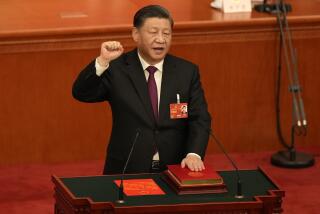NEWS ANALYSIS : China Congress a Pep Rally for Party Line
- Share via
BEIJING — The dominant front-page headline of the official English-language China Daily on Wednesday was surely written with no sarcasm intended: “Delegates sing their praise for Party line.”
The headline simply captured the pep-rally atmosphere surrounding a weeklong Communist Party Congress that opened Monday. Dedicated to the proposition that China can build a market economy under a Communist dictatorship, the congress is not so much a decision-making gathering as it is a giant exercise in nationwide thought reform.
The 2,000 delegates will soon return to their home provinces to take leading roles in implementing the new party line. And during the congress, not only the delegates but also the 1.1 billion people of China are being subjected to a barrage of commentary about the glories of a “socialist market economy.”
“Uphold the Unity of Thought Liberation and Seeking Truth From Facts,” People’s Daily, China’s most important newspaper, declared in the headline of a story that summarized comments made to Shanghai delegates Tuesday by Communist Party General Secretary Jiang Zemin.
Jiang’s main point, the article said, was that the party now requires that “the thinking of the people conform with realities.” The clear implication is that for several decades of Communist rule, the party demanded that people’s thinking not conform with reality--and that the time has finally come to fix this problem.
But old ways have not been entirely abandoned. It seems that the party wants this new, more accurate thinking to be accepted more or less unanimously.
And if one were to judge from reports Tuesday and Wednesday in China’s state-run television, newspapers and wire services, it would appear that all congress delegates and virtually the entire nation are, indeed, deeply enthusiastic about the latest party line.
Jiang’s report Monday to the congress, in which he proclaimed that China intends to develop a “socialist market economy,” immediately won “unanimous support of delegates from the armed forces,” the official New China News Agency said. It also reported, in what apparently was intended as high praise, that students at Beijing University, the key hotbed of China’s 1989 pro-democracy movement, “care for the ongoing party congress like they had cared for the Barcelona Olympics.”
Even foreign correspondents and Chinese journalists, about 400 in all, were forced to play bit parts in the great drama. The Communist Party secretaries from three of the most reform-oriented coastal regions--Guangdong, Shanghai and Shandong--gave a press conference that produced not a shred of genuine news but plenty of impressive footage for domestic television.
The swarm of journalists, the bright lights and TV cameras, even a table jammed with tape recorders, all were broadcast on the evening news as part of the backdrop to lectures by the three party secretaries on the accomplishments of reform and the bright prospects for the future.
The point of all this activity is to further dismantle the legacy of Chairman Mao Tse-tung, who stressed egalitarianism, class struggle and central planning rather than the single-minded devotion to economic development now in vogue.
The New China News Agency came up Wednesday with the perfect media point man for this effort: Mao Shiwen, 44, Communist secretary of Mao’s hometown, Shaoshan, and a distant relative of the late chairman.
A decade ago, the people of Shaoshan “thought doing business meant a loss of face” and wouldn’t even sell eggs, Mao Shiwen said. Now there are 2,000 private businesses in Shaoshan, including 300 eateries whose owners claim to be related to the chairman. “Doing business is a sure way for local people to get rich,” Mao said. “What they feel ashamed of now is failure to earn money or get rich. . . . If Chairman Mao knew we are better off, he would surely be happy about it.”
More to Read
Sign up for Essential California
The most important California stories and recommendations in your inbox every morning.
You may occasionally receive promotional content from the Los Angeles Times.













